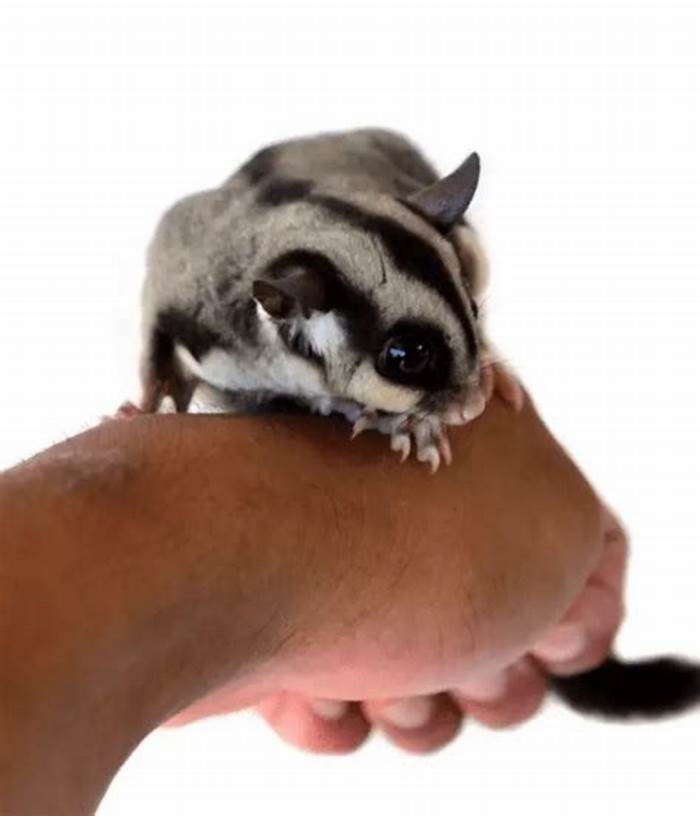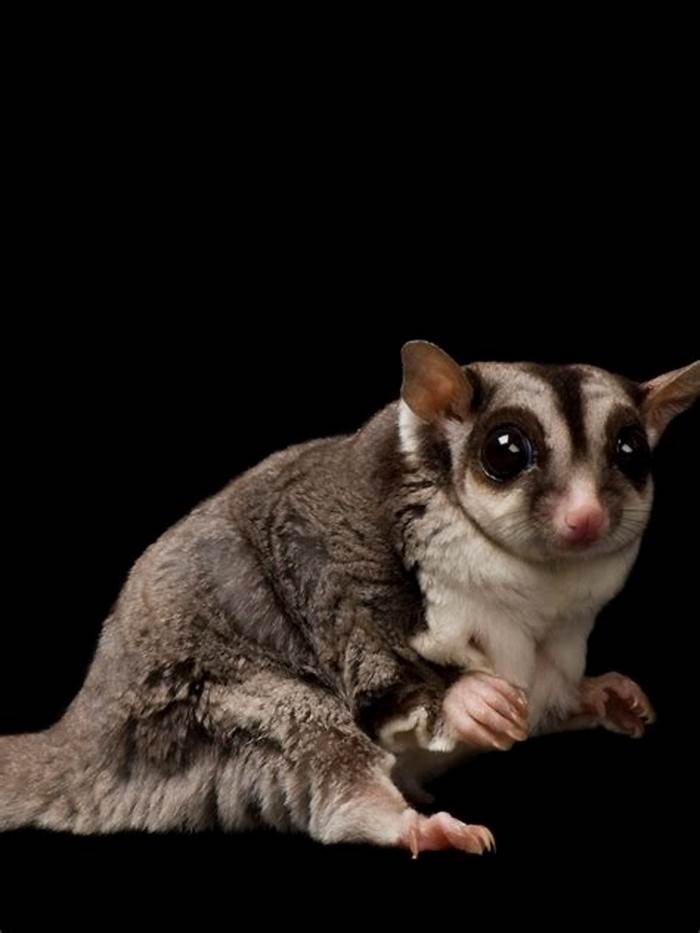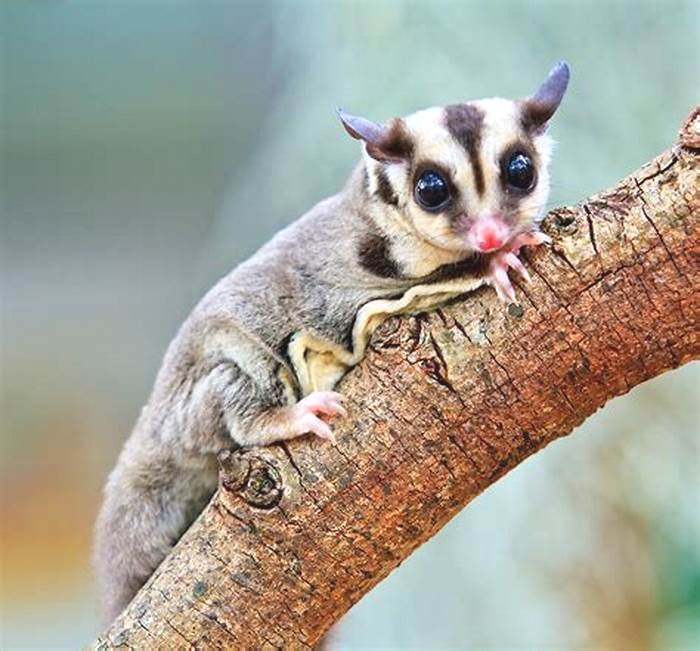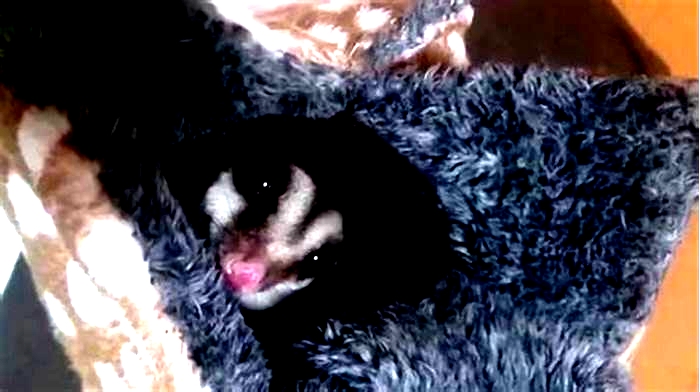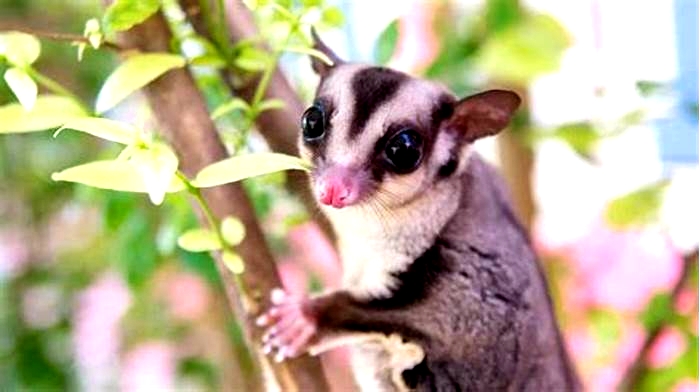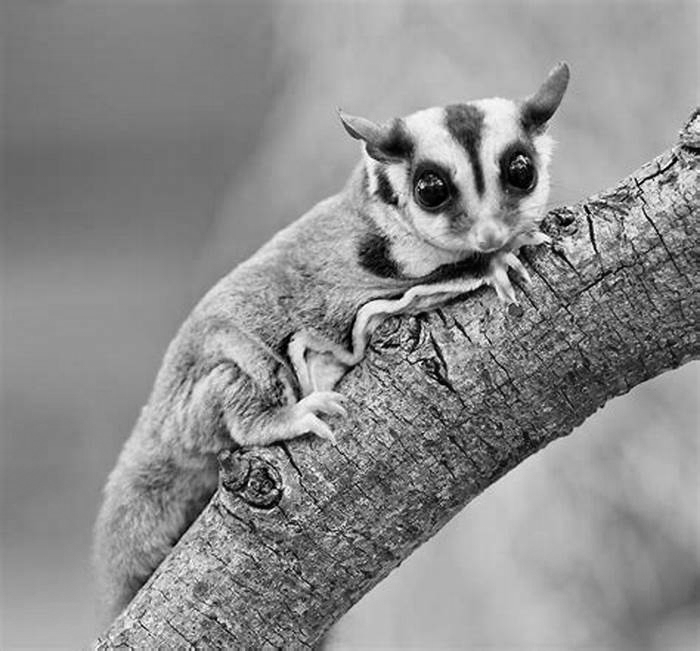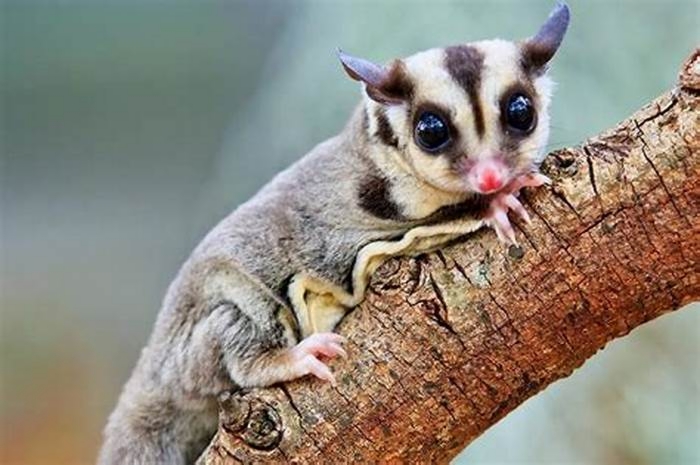Do sugar gliders smell
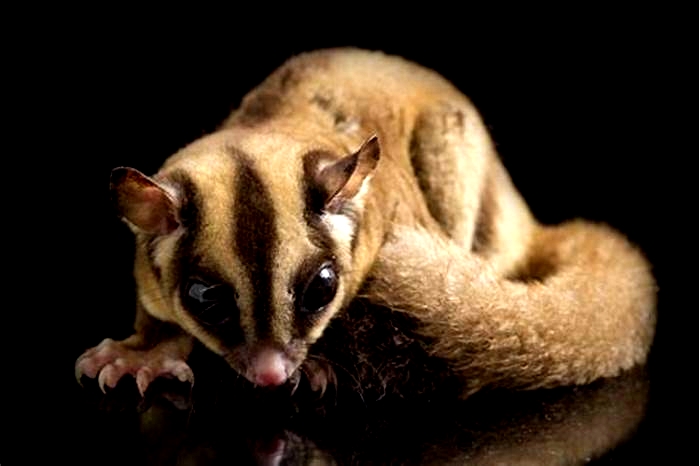
Do Sugar Gliders Smell?
There are many questions that arise when youre bringing a new pet home. What do they eat? How do I train them? Do they bite? All of these are important questions to know the answer to, but theres a question thats very prominent in regards to exotic animals: Do they smell?
This post will go in depth about a sugar gliders various scents and tell you exactly how you can reduce any unpleasant smells that arise.
Do Sugar Gliders Smell?
Yes, sugar gliders do smell, but not just a singular scent. Instead, sugar gliders have a variety of smells that range from normal and faint to problematic and strong. Knowing what the different smells are will help you to identify whether or not theyre problematic.
Anyone thats come in contact with sugar gliders will tell you that these creatures do have a smell, but it isnt as pronounced and off-putting as that of a ferret. The standard smell that sugar gliders have isnt akin to an unwashed animal its more of a natural must of that creature. To most owners, this natural smell isnt bad at all.
The natural smell of a sugar glider can change over time, though, due to factors such as age, health, diet, and their environment. A lot of these factors can be influenced to help control their smell, so dont let that scare you!
Real quick, it should be noted that mostly every sugar glider will have a slight smell to them no matter what they do. Theyre living animals, and their natural musk is part of their biology. So, even the most well-care-for sugar gliders will never be entirely scentless.
What Gives A Sugar Glider Their Natural Smell?
A few factors determine the natural scent of a sugar glider, and all of them come down to that sugar gliders biology and inherent physical traits. Specifically, their smell is caused by scent glands in their skin.
These scent glands are what gives sugar gliders their musky smell. The purpose of these glands is quite simple theyre used to give off a smell that helps with communications and familiarization in the wild. Sugar gliders can identify each other with these scent glands, and theyre simply a natural characteristic that many creatures have.
Intact male sugar gliders have very prominent scent glands that develop as the sugar glider matures. These glands are visible in two locations on the sugar glider: one on top of the head in the form of a bald spot, and one on the chest right under the neck. This results in males having a stronger natural scent than females.
So, while scent glands help to explain why sugar gliders have a certain musk, they arent the reason behind why some sugar gliders and their enclosures smell downright bad.
What Causes Sugar Gliders To Smell Bad?
Theres a significant difference between sugar gliders that smell and sugar gliders that stink. Smelly sugar gliders are simply a result of their biology and years of evolution. Stinky sugar gliders, on the other hand, are a result of a few different factors that can mostly be controlled by their owner.
If youve experienced someone talking about how bad sugar gliders smell, theres a good chance that theyve experienced unhealthy sugar gliders in a poorly-maintained environment. Dirty sugar gliders and dirty cages are the two main reasons for bad smells.
Dirty Sugar Gliders
Although theyre extremely cute, sugar gliders can get dirty and smelly just like any other living animal. While most sugar gliders shouldnt be able to get exceptionally dirty if theyre kept inside of your clean home, they can get a bit dirty on the inside through a poor diet!
If sugar gliders are fed diets that dont align with their natural needs, or if theyre oversupplied with vitamins, theyll produce much more waste than a normal sugar glider. Sugar gliders that eat a poor diet will experience digestive problems that almost always result in smelly poops. This is amassivecause for smelly sugar gliders!
Its important to know that sugar gliders are quite clean on the outside. They constantly groom themselves and their cage mates, so theyre always on top of their hygiene. You should only wash your sugar glider if they somehow get excessively dirty, in which case a damp washcloth rubbed over their fur would do wonders.
Poor Cage Maintenance
Ironically, a good portion of bad sugar glider smells comes as a result of excessive cage cleaning. If you meticulously and regularly clean a sugar gliders cage, toys, beds, and accessories, the gliders will quickly undo your efforts by remarking their territory. This involves peeing around their cage to get their scent prominent again.
When a sugar glider is marking their territory, youll know. The smell is quite strong and is clearly something that youll want to actively avoid.
Additionally, youll want to make sure that youre on top of waste removal. If you dont clean your sugar gliders fleece bedding enough, it can definitely result in some very foul smells. This is a simple part of good animal husbandry that most people practice, though, so this tidbit of information is nothing revolutionary.
Keeping Sugar Gliders & Their Cages Smelling Good
In order to keep your sugar gliders smelling as fresh and clean as possible, there are two main things that you need to do as their owner. By taking the time to do the things highlighted below, youll drastically reduce the smell of your sugar gliders in addition to keeping their health in tip top shape.
Feeding A Proper Diet
Every living creature has evolved around a specific diet that theyve been eating. Their bodies have become optimized for digesting and processing certain foods to give them the energy that they need to live. If they eat foods that dont meet those requirements, some serious problems may arise.
Sugar gliders are no exception to this. These creatures have specific dietary needs that need to be met to ensure proper digestion. The optimal sugar glider diet consists of a healthy pellet food, a nectar-based mixture, multi-vitamins, and fresh fruits and vegetables. If a sugar glider isnt given a part of this diet, or if theyre given too much of one type (often fruit), digestion will be a challenge.
Its important to fine-tune your sugar gliders diet as they grow. If theyre not reacting the best to a particular diet, consider tweaking it and observing the results of that change. Healthy bowel movements will make a sugar gliders environment smell infinitely better.
Optimal Cleaning Of Cages
Sugar gliders are quite territorial and will quickly mark their territory if they cant smell themselves in their environment. This process is extremely smelly and should be reduced as much as possible. You want to keep the cage clean, but you dont want to remove their natural scent.
Therefore, a way to keep a sugar gliders cage smelling more fresh is by cleaning it less! Or, more specifically, by splitting up the cleaning. One day you can wipe down the cage, another day you can clean bedding, and another day can be the day that you thoroughly clean their toys. This ensures that their scent is always present in their cage just not very prominently.
Then, of course, youll want to spot clean any urine or feces from the bottom of their cage. Staying on top of cleaning like this is a huge aspect of keeping a sugar gliders environment smelling fresh.
Do Sugar Gliders Smell? [Causes and What Owners Can Do]
Sugar Gliders are cute little creatures. You may struggle to imagine them being a cause of anything negative, such as an odor in your home. But do they smell naturally or typically cause a stench in their owners homes? Lets find out!
So, do Sugar gliders smell? Sugar gliders do have their own unique natural smell, but owners often report that this is not unpleasant. Infant sugar gliders may smell of urine and feces while their digestive systems are still developing, but regular cleaning and litter training can keep foul smells at bay.
While sugar gliders naturally produce their own scent, other causes of smell can range from mild to pungent.
That has a lot to do with your care, and how regularly you clean their habitat.
Its ultimately your responsibility. Just would be the case with any other pet.
With this in mind, let us now take a look at the main causes of smells when keeping sugar gliders and some of the practical things that you can do to reduce or greatly eliminate them from occurring or dominating your home.
A Sugar Gliders Natural Smell
Sugar gliders do carry their own natural smell. It is not considered smelly, as you would expect in other animals such as ferrets. Their natural smell does not smell foul or off-putting, instead, it is more of a musk.
This musk will be present regardless of whether they are bathed, or even if the sugar glider cleans themselves regularly.
As you can imagine, they are animals and this smell is produced and will always exist to some extent.
Most owners report that this smell is not a problem and that you will soon get used to it to the point of not recognizing it.
It is important to note that the smell of a sugar glider may change in time or due to specific factors.
The most notable are age, health, diet, and the environment.
As you can imagine, you are in control of at least two of these factors (diet, environment), meaning as an owner you can influence and eliminate some element of odor.
Causes of A Sugar Gliders Natural Smell
Sugar Gliders are of course living animals that will naturally smell. If you get close enough, you will detect their particular smell. But why is this?
There are a few reasons why a sugar glider produces its own scent.
First and foremost, it is a by-product of their biology and physical makeup.
Sugar gliders have scent glands in their skin, which emit the smell specifically to communicate within their environment.
The scent is used by wild sugar gliders as a way to communicate with other sugar gliders its a natural phenomenon found in many wild animals.
Scent glands in sugar gliders are known to develop as they age, and are even more prominent in males.
They reside on the top of their heads, and under the necks.
It is the scent glands that give them their natural musk, but this is not overtly smelly or troublesome.
One other final smell to consider that a glider will themselves produce, is when they feel threatened.
During such times, they will emit a strong foul smell as a defense mechanism.
However, over time and as you bond with your pet, this smell will not be released as they become more confident in you and their surroundings.
Managing this smell is all about gaining their trust.
To bond with your sugar glider, many owners carry them in a pouch or a pocket.
This bonding phase can get a little messy at the beginning, but it is important to do nonetheless.
Yet, there are certain major causes of smells that go beyond what they should produce naturally. We will look at these in the following section.
Causes Of Bad Smells With Sugar Gliders
There are many reasons why a sugar glider may not smell so well, although generally speaking, gliders are very clean animals that groom themselves and rarely need bathing.
Lets look at common reasons why sugar gliders begin to smell beyond their own musk and what they should:
Fed An Incorrect Diet
There are numerous complicated meal plans available all over the internet, that may not be suitable for your sugar glider.
These poor diets can cause your glider to develop a prominent and robust musky smell like that of a ferret.
This smell can be hard to eradicate once it starts and is not how a glider should smell.
Not Litter Trained
The bathroom habits of sugar gliders run like clockwork, making potty training easier.
Once you learn the sleep schedule of your little marsupial litter placement is possible. As soon as gliders awake, nature calls.
They never eliminate where they sleep.
If a glider is not trained, they can poop and urinate all of their cages.
The result is that smells and odors and not contained, and they are thus harder to clean up and eradicate.
Spot cleans will not be able to remove all of the waste meaning that it stays in the cage longer; festering and decaying over the course of the time it takes for you to run your next deep clean.
Instead, litter training means that you can remove their waste on a daily, every other day schedule quickly, easily and effectively.
Male Sugar Gliders Claim Their Territory
Male gliders have scent glands that they rub over every surface, this includes their cage, all items within it, and any items in your home they pass over e.g. furniture.
Scent markings are the way males claim their territory. It is natural and not something that you can control.
How Do I Stop My Sugar Glider From Smelling?
The number one cause of bad smells from a sugar glider is feeding them an incorrect diet and not cleaning their cage regularly enough.
You must mimic what they eat in the wild and be on time with their sleeping and feeding schedules.
In their natural environment, sugar gliders are seasonal omnivores.
During the summer, these marsupials, dine on insects and spiders.
In the winter, live food is scarce, so their food source comes from plants like fruit tree nectar, eucalyptus sap, manna, acacia gum, and honeydew bark, we will discuss their diet in captivity in more detail.
Lets look at how to stop a sugar glider from smelling:
Proper Nutrition
Pet sugar gliders require a diet consisting of 25% protein (commercially available pellet diets for insect eaters, cooked eggs, small amounts of cooked meat, and small amounts of gut-loaded bugs).
With 25% green leafy vegetables and small amounts of fruit that include mangos, grapes, apples, papayas, and berries.
Gliders require about 50% of commercial pelleted food that serves as a source of nectar.
Gliders naturally graze throughout the day as opposed to feeding on a schedule. Food must be available at all times unless your pet is overweight.
Regardless of their diet, the diet of sugar gliders requires supplements with vitamin and mineral powder with calcium.
A powdered supplement (like this excellent brand on Amazon) must be sprinkled on their food daily. You must discuss your pets diet with a vet who is familiar with sugar glider care and nutrition.
There are certain foods that you should not feed to your sugar glider; these include wild insects, like spiders, worms, and any other insects that might be contaminated with pesticides.
Other foods that you should avoid are fruit pits, apple seeds, deep-fried or processed foods, foods high in fat or sugar, and artificially sweetened foods.
Grapes are also the subject of much controversy. Whether you feed these is something to consider.
Litter Training Your Sugar Glider
As previously mentioned sugar gliders are predictable in their bathroom habits; they wake up from sleeping needing to defecate or urinate.
Getting a litter box (like this) and placing it in a fixed position in your sugar gliders cage is the first thing that you should do.
From there, you need to proactively encourage your sugar glider to use it, and consistently.
Unscented baby wipes are a must when training your glider to use the litter box.
You can use a baby wipe to stimulate bowel movement and urination.
Gently rub your gliders bottom and genitals with the baby wipe, once he eliminates switch your glider over to your other hand, this exercise stimulates his digestive tract, ensuring all urine and feces are released.
Continue this process as many times as is needed without stopping in the middle.
Clean Your Sugar Gliders Habitat
Putting special liners on the bottom of your pets cage makes cleaning after your glider that bit easier, as the floor tends to accumulate dirt and debris.
Make sure that you change these liners every day to prevent the build-up of harmful bacteria.
Clean their food and water bowls daily using solutions that are safe for pets.
Perform a deep clean of your gliders habitat at least once every two weeks; this will remove all debris from old food and scent marking smells keeping their habitat clean and odor-free also helps to keep body odors at bay.
Finally
Sugar gliders, when fed a correct diet, will produce virtually no foul-smelling odors.
People indeed have different sensitivities to smells.
Most individuals regard sugar gliders as odorless (especially owners who have had them for some time), while some pick up a distinctive odor this is the musk (and is usually notable when owners first get their glider)
If you happen to detect a scent from your pet, chances are you have a keen olfactory nerve.
Thankfully, most people get used to their fragrance, and it becomes less of a distraction.
So back to our original question, as to whether sugar gliders smell. All living creatures have a particular scent; anything that exists has a smell; this includes inanimate objects such as furniture.
With that said, sugar gliders are not known to smell bad, because, like cats, they keep themselves clean.
Sugar gliders can emit foul smells when they are young as they cant hold in their urine and feces, sometimes these creatures emit a foul odor when they are afraid.
Once your glider bonds with you, and is fed the right foods, many of these foul odors should go altogether.
You must clean their cage frequently as dirt and debris can create an unpleasant atmosphere and horrid smells.
Training your glider to use the litter box should be easy as long as you familiarize yourself with their sleep schedule as they go once they wake up.
Related Questions
Do You Give Sugar Gliders Baths?Sugar gliders will clean themselves very well naturally. It is not recommended to give your sugar glider a bath. Bathing with water, soap, and products such as shampoo/conditioner can dry out the fur and skin. The process can be particularly worrying to your glider too. If you do decide to bathe your glider, you should do so very infrequently and only in specific circumstances e.g. if they were to get dirty or have feces caked onto their fur. You should also use a safe, chemical-free animal-friendly shampoo product like this.
Do Sugar Gliders Use A Litter Box?Sugar gliders will not instinctively use a litter box but you can train them to do so. Training a sugar glider to use their litter box can ensure that their cage is a more hygienic, less foul-smelling environment with fewer bacteria and germs.
How Often Should I Clean My Sugar Gliders Cage?You should look to provide regular spot cleans of your sugar gliders cage every couple of days. A more thorough deep clean, with the use of a pet-friendly detergent that is thoroughly washed away before returning your glider to the cage, should be done every 2-weeks to a month.
I am an experienced pet owner with decades of experience owning a number of different pets, from traditional pets like dogs and cats, to the more exotic like reptiles and rodents. I currently own a Cockapoo (pictured) called Bailey. I am also the main writer and chief editor here at Pet Educate; a site dedicated to sharing evidence-based insights and guidance, based on my vast pet ownership knowledge, experience, and extensive research.

